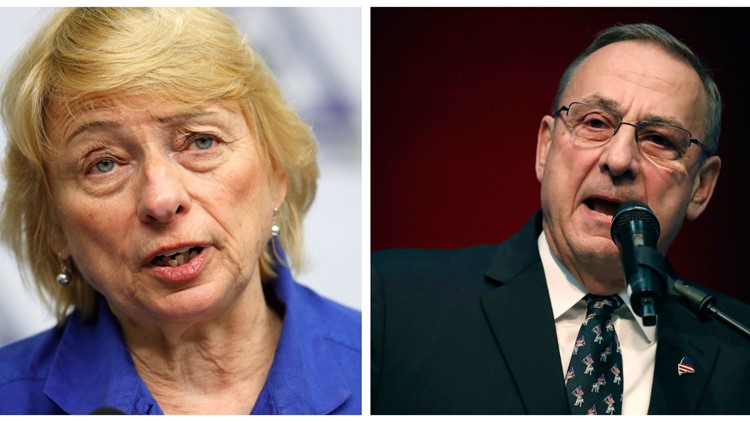AUGUSTA, Maine — While issues like the economy and reproductive rights could be some of the biggest factors for Mainers in November's gubernatorial race, there might also be something to learn from elections in 2014 and 2018.
Dr. Mark Brewer is a professor and political science department chair at the University of Maine.
Past gubernatorial elections
In 2014, then Gov. Paul LePage defeated Democratic challenger Michael Michaud by 294,189 votes to 264,369. Independent Eliot Cutler earned 51,405 votes in that election.
Brewer said LePage's victory came because he was the incumbent, and while he wasn't overwhelmingly popular, the Republican had a very strong base of supporters who thought he did a good job in the first term and wanted him again.
"More than anything else, 2014 was a combination of a strong first term as governor for LePage and a less-than-stellar campaign for Mike Michaud as his opponent," Brewer said.
In 2018, Janet Mills defeated Republican challenger Shawn Moody by 320,962 votes to 272,311. Independent Terry Hayes secured 37,268 votes.
Brewer told NEWS CENTER Maine Mills was a long-time figure in various offices across the state and had just finished up a high-profile term as attorney general where she'd locked horns with LePage multiple times. By comparison, Moody was a very successful independent business leader and the hand-picked successor by LePage. According to Brewer, Moody wasn't a candidate in the same caliber as LePage.
"It's also important to point out Moody was relatively inexperienced in politics at any level," he said.
Maine voters were dealing with two candidates of very different levels of public recognition and experience, and 2018 was a relatively solid year for Democrats, according to Brewer.
"It's very hard for any party to hold the Blaine House for three terms in a row," he said.
Of course, once again there's an independent candidate in the gubernatorial race with Sam Hunkler. But right now, Brewer said he doesn't believe Hunkler will secure six to eight percent of the vote like Cutler and Hayes did in their respective gubernatorial races.
"If he cracked one percent, I'd be surprised," Brewer said.
The political science professor noted Cuter ran a very high-profile independent bid in 2010 and almost won. And while he didn't do as well in 2014, he had high name recognition. And Hayes had been a long-time state official in the Legislature. By comparison, Hunkler is a retired physician.
"Is he gonna get some votes? Sure. Is it gonna be eight percent or six percent? Today? No chance of hitting either of those numbers," Brewer said. "Can he get there by November? Maybe. The odds are stacked against him."
Mills earned over 26,000 more votes in 2018 than LePage did in 2014, but Brewer said he generally wouldn't put a whole lot of stock in the vote totals either got in a statewide run.
Plenty will be different in November, with maybe the biggest change being they're running against each other. They haven't done that before.
"This is a different animal than either of the last two gubernatorial elections," the professor said.
If LePage wins in November, it'll be his third term in the Blaine House. Brewer said no Maine politician has won three gubernatorial terms in the modern era. But going back to the 19th century when the Maine governor served only a year, and there were no term limits? Yes. Some candidates won 4-5 terms, but it was a very different office then.
Comparing competitors
Comparing Moody to LePage as Republican challengers for Mills, Brewer said, "It's a whole different kettle of fish. LePage is not Moody. He's about as strong as an opponent as Gov. Mills might face."
But comparing Michaud to Mills as Democratic challengers for LePage, Brewer said it's a more complicated question.
"Lots of folks thought Michaud was a strong candidate in 2014," Brewer said.
He was a multi-term congressman holding Maine's 2nd Congressional District, which is a pretty good proxy for statewide success for a Democrat, according to Brewer.
"We thought he was going to be a strong candidate in 2014, and it didn't work out that way," he said. "LePage's campaign was well done."
Population increase
Maine's population in 2014 was around 1.329 million. In 2020, it was about 1.341 million. When asked about how increasing population might impact the gubernatorial race in November, Brewer told NEWS CENTER Maine the most obvious answer is there could be more votes, but that doesn't necessarily translate.
Going beyond that, it's hard to say, according to the professor. Anecdotally, Brewer's heard a lot of stories about Maine in-migration during COVID. But he asked how much of that will result in eligible voters? Where are they coming from?
"We need to know more about the source of the growth before we can say anything about how it'll impact the 2022 election cycle," Brewer added.
National analysis
The Cook Political Report currently lists Maine's gubernatorial race as "Lean D."
Brewer said, "I would certainly put this as a lean Democrat race, but I wouldn't go any further than that."
National figures don't lean Democrat. If someone pushed that rating to "toss-up," the professor said he might not argue with that.
Democrat, attorney, and former talk radio host Ken Altshuler, and Republican, former state senator, and Yarmouth town councilor Phil Harriman have both appeared on NEWS CENTER Maine's Political Brew program as analysts.
Maine Democratic analysis
Looking at the 2010 gubernatorial race, Altshuler said LePage eked out a victory by a "scant" 1.4 percent of the vote over Cutler in 2010. He argued the "liberal" vote was divided between Cutler and Democratic gubernatorial candidate Libby Mitchell.
"Obviously, Cutler did not generate as much enthusiasm in 2014, and LePage easily coasted to victory with 48% of the vote," the attorney said.
Altshuler said lessons learned from the 2014 election include:
- It's rare for an incumbent governor to lose reelection in Maine.
- Once a candidate's base is established, it's hard to beat the candidate.
The attorney said Mills won in 2018 with little more than 50 percent of the vote, and Hayes was almost a spoiler with six percent. He added Mills benefitted from the national trend of Democrats gaining seven governorships up for reelection in 2018.
There weren't a lot of significant lessons to learn from the governor's race in 2018 because it was an open seat without the power of the incumbency, according to Altshuler.
In 2022, Mills has Maine's relatively healthy economy going for her, despite the national economy in sharp decline, the attorney said. That health is thanks, in part, to a huge influx of federal money, which, Altshuler said, Mills had nothing to do with.
With that said, Mills will get credit for the coffers being flush and most Mainers getting a check in the mail for $850, according to Altshuler.
Past lessons tell Mainers that LePage's base is strong and will vote for him without deviation, the attorney said.
"The issue becomes the 10-15 percent of voters who claim to either be independent or simply not aligned with either party," he said. "If LePage can suppress his boisterous communication with people, he may be attractive to those voters who believe that he would be a better financial steward for Maine despite the current appearance of Maine being financially healthy."
Of course, the new twist in the election scene is the overturning of Roe v. Wade, Altshuler said. LePage is, and will, attempt to avoid taking any abortion position through the election.
The attorney added if Mills keeps his feet to the fire and makes him take a position, he could lose enough independent, or women, votes to seal a Mills reelection.
"I do not think a neutral approach to the issue will get past voters," he said.
Altshuler said he believes this is Mills' election to lose because of the success incumbents have when running for reelection, the financial benefits Mainers are receiving due to federal money, some of Trump's tarnish being attached to LePage personality-wise, and Mills being a strong supporter of women's rights of choice.
"However, the election is still a relatively long way away. Feelings over Roe could dissipate before November, and the Dems are going to take a drubbing in the House in November. I still pick Mills as the odds-on favorite to win," he said.
Maine GOP analysis
Analyzing the GOP's Maine gubernatorial victory in 2014, Harriman said, "What stands out to me in that race is there were several events that collided in a positive way to LePage."
First, former First Lady Barbara Bush did a commercial for the then-Republican governor that really connected the people's admiration for her to support LePage.
Second, there was a bear-baiting referendum that got enough petition signatures to ask voters whether bear hunters should be prevented from baiting to attract bears.
"[A] significant number of outdoors people who cared enough about that issue that may not have ordinarily cared about voting. They came out to vote on that question, and they fell predominantly for LePage," Harriman said.
Third, there was a nurse in Aroostook County exposed to Ebola overseas who defied orders to quarantine. LePage made that a story, a significant news item that garnered him Maine and national news reporting, according to Harriman.
Those three things in combination weeks before the 2014 election influenced those who determined the outcome of the race.
"It was predicted LePage would lose," Harriman said.
In 2018's gubernatorial election, the post-election analysis discovered the Democratic Party really zeroed-in on getting people to register to vote and getting them to the polls. That race turned out to be farther apart than predicted, according to Harriman.
"I think their on-the-ground voter registration activism made the difference," he said.
Looking ahead to November, there's a combination of things to learn from 2014 and 2018, Harriman said. How effective is either party and their respective campaigns going to be in identifying and motivating voters to participate?
The upcoming gubernatorial race is likely to be circumstantial, meaning, whether Mainers are concerned about energy prices, women's health reproductive choices, or inflation factors, those issues are still as emotionally charged as they are today, according to the former legislator.
"I think that's gonna have a significant influence on the outcome of the race," Harriman said. "Likely, Republicans are going to learn from what they experienced in 2018 with Dems turning out and identifying voters."
At this time, Harriman said he agrees with the Cook Political Report's current label of "Lean D" for the gubernatorial race assessment.
"People are feeling like the governor has done a competent job of navigating us through all the turbulence we've been through," he said. "I haven't seen the Cook Report, but I'm sensing it may not reflect the depth of concern people have about what's ahead."
Harriman added, "When all of this federal debt that was spewed all over Maine begins to work its way through government, I think people are going to become very concerned about that. Are we going to be able to maintain this level of services without needing major tax increases?"



